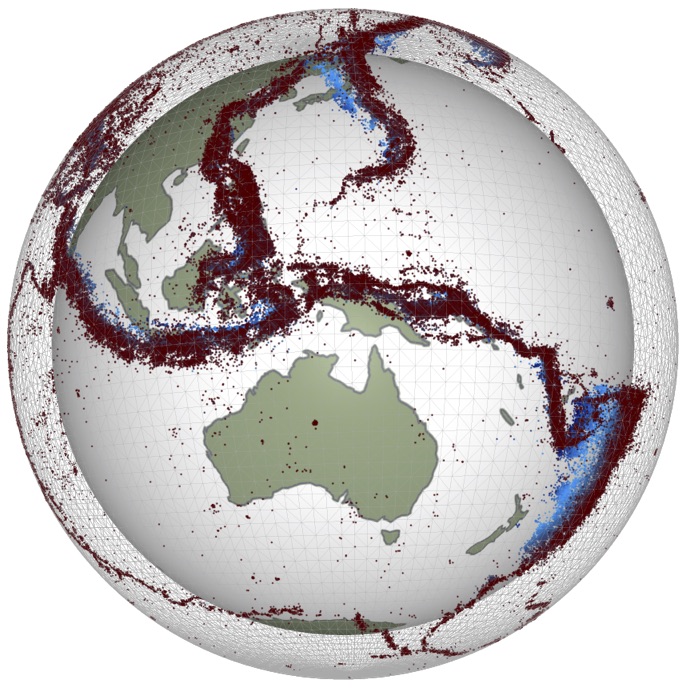Stokes Benchmark SolCx#
# %%
import petsc4py
from petsc4py import PETSc
import nest_asyncio
nest_asyncio.apply()
# options = PETSc.Options()
# options["help"] = None
import os
os.environ["UW_TIMING_ENABLE"] = "1"
import underworld3 as uw
from underworld3.systems import Stokes
from underworld3 import function
from underworld3 import timing
import numpy as np
import sympy
from sympy import Piecewise
# %%
n_els = 4
refinement = 2
mesh1 = uw.meshing.UnstructuredSimplexBox(regular=True,
minCoords=(0.0, 0.0), maxCoords=(1.0, 1.0), cellSize=1 / n_els,
qdegree=3, refinement=refinement
)
mesh2 = uw.meshing.StructuredQuadBox(
elementRes=(n_els, n_els),
minCoords=(0.0, 0.0),
maxCoords=(1.0, 1.0),
qdegree=3,
refinement=refinement
)
mesh = mesh1
x,y = mesh.X
stokes = uw.systems.Stokes(mesh, verbose=True)
v = stokes.Unknowns.u
p = stokes.Unknowns.p
stokes.constitutive_model=uw.constitutive_models.ViscousFlowModel(stokes.Unknowns)
stokes.constitutive_model.Parameters.shear_viscosity_0 = 1
# %%
T = uw.discretisation.MeshVariable("T", mesh, 1, degree=3, continuous=True, varsymbol=r"{T}")
T2 = uw.discretisation.MeshVariable("T2", mesh, 1, degree=3, continuous=True, varsymbol=r"{T_2}")
v0 = stokes.Unknowns.u.clone("V0", r"{v_0}")
v1 = v0.clone("V1", r"{v_1}")
eta_0 = 1.0
x_c = 0.5
f_0 = 1.0
stokes.penalty = 100.0
stokes.bodyforce = sympy.Matrix(
[
0,
Piecewise(
(f_0, x > x_c),
(0.0, True),
),
]
)
# This is the other way to impose no vertical flow
# stokes.add_natural_bc( [0.0,1e5*v.sym[1]], "Top") # Top "free slip / penalty"
# free slip.
stokes.add_dirichlet_bc((sympy.oo, 0.0), "Top")
stokes.add_dirichlet_bc((sympy.oo,0.0), "Bottom")
stokes.add_dirichlet_bc((0.0,sympy.oo), "Left")
stokes.add_dirichlet_bc((0.0,sympy.oo), "Right")
We may need to adjust the tolerance if \(\Delta \eta\) is large
stokes.tolerance = 1.0e-6
stokes.petsc_options["snes_monitor"]= None
stokes.petsc_options["ksp_monitor"] = None
stokes.petsc_options["snes_type"] = "newtonls"
stokes.petsc_options["ksp_type"] = "fgmres"
# stokes.petsc_options.setValue("fieldsplit_velocity_pc_type", "mg")
stokes.petsc_options.setValue("fieldsplit_velocity_pc_mg_type", "kaskade")
stokes.petsc_options.setValue("fieldsplit_velocity_pc_mg_cycle_type", "w")
stokes.petsc_options["fieldsplit_velocity_mg_coarse_pc_type"] = "svd"
stokes.petsc_options[f"fieldsplit_velocity_ksp_type"] = "fcg"
stokes.petsc_options[f"fieldsplit_velocity_mg_levels_ksp_type"] = "chebyshev"
stokes.petsc_options[f"fieldsplit_velocity_mg_levels_ksp_max_it"] = 7
stokes.petsc_options[f"fieldsplit_velocity_mg_levels_ksp_converged_maxits"] = None
# gasm is super-fast ... but mg seems to be bulletproof
# gamg is toughest wrt viscosity
stokes.petsc_options.setValue("fieldsplit_pressure_pc_type", "gamg")
stokes.petsc_options.setValue("fieldsplit_pressure_pc_mg_type", "additive")
stokes.petsc_options.setValue("fieldsplit_pressure_pc_mg_cycle_type", "v")
# # # mg, multiplicative - very robust ... similar to gamg, additive
# stokes.petsc_options.setValue("fieldsplit_pressure_pc_type", "mg")
# stokes.petsc_options.setValue("fieldsplit_pressure_pc_mg_type", "multiplicative")
# stokes.petsc_options.setValue("fieldsplit_pressure_pc_mg_cycle_type", "v")
# stokes._setup_pointwise_functions(verbose=True)
# stokes._setup_discretisation(verbose=True)
# stokes.dm.ds.view()
# %%
# Solve time
stokes.solve()
uw.discretisation.meshVariable_lookup_by_symbol(mesh, v.sym)
uw.discretisation.meshVariable_lookup_by_symbol(mesh, v.sym)
Visualise it !#
# check the mesh if in a notebook / serial
if uw.mpi.size == 1:
import pyvista as pv
import underworld3.visualisation as vis
pvmesh = vis.mesh_to_pv_mesh(mesh)
pvmesh.point_data["V"] = vis.vector_fn_to_pv_points(pvmesh, v.sym)
pvmesh.point_data["T"] = vis.scalar_fn_to_pv_points(pvmesh, stokes.bodyforce[1])
pvmesh.point_data["Vmag"] = vis.scalar_fn_to_pv_points(pvmesh, v.sym.dot(v.sym))
velocity_points = vis.meshVariable_to_pv_cloud(v)
velocity_points.point_data["V"] = vis.vector_fn_to_pv_points(velocity_points, v.sym)
pl = pv.Plotter(window_size=(1000, 750))
pl.add_mesh(
pvmesh,
cmap="coolwarm",
edge_color="Black",
show_edges=True,
scalars="Vmag",
use_transparency=False,
opacity=1.0,
)
arrows = pl.add_arrows(velocity_points.points, velocity_points.point_data["V"], mag=3.0, opacity=1, show_scalar_bar=False)
pl.show(cpos="xy")
SolCx from the same setup#
stokes.bodyforce = sympy.Matrix(
[0, -sympy.cos(sympy.pi * x) * sympy.sin(2 * sympy.pi * y)]
)
viscosity_fn = sympy.Piecewise(
(1.0e6, x > x_c),
(1.0, True),
)
stokes.constitutive_model.Parameters.shear_viscosity_0 = viscosity_fn
stokes.constitutive_model.Parameters.shear_viscosity_0
stokes.saddle_preconditioner = sympy.simplify(1 / (stokes.constitutive_model.viscosity + stokes.penalty))
timing.reset()
timing.start()
stokes.solve(zero_init_guess=True)
timing.print_table(display_fraction=0.999)
# Save this solution
with mesh.access(v0):
v0.data[...] = v.data[...]
# reset and re-do with natural bcs
stokes._reset()
stokes.tolerance = 1.0e-6
stokes.add_natural_bc([0.0,1e6*v.sym[1]], "Top")
stokes.add_dirichlet_bc((sympy.oo,0.0), "Bottom")
stokes.add_dirichlet_bc((0.0,sympy.oo), "Left")
stokes.add_dirichlet_bc((0.0,sympy.oo), "Right")
stokes.solve()
with mesh.access(v1):
v1.data[...] = v.data[...]
# reset and re-do with natural bcs & petsc normals
stokes._reset()
stokes.tolerance = 1.0e-6
Gamma = mesh.Gamma
stokes.add_natural_bc(1e6 * Gamma.dot(v.sym) * Gamma, "Top")
stokes.add_dirichlet_bc((sympy.oo,0.0), "Bottom")
stokes.add_dirichlet_bc((0.0,sympy.oo), "Left")
stokes.add_dirichlet_bc((0.0,sympy.oo), "Right")
stokes.solve(debug=False, verbose=False)
# check the mesh if in a notebook / serial
if uw.mpi.size == 1:
import pyvista as pv
import underworld3.visualisation as vis
pvmesh = vis.mesh_to_pv_mesh(mesh)
pvmesh.point_data["Vmag"] = vis.scalar_fn_to_pv_points(pvmesh, v0.sym.dot(v0.sym))
pvmesh.point_data["Visc"] = vis.scalar_fn_to_pv_points(pvmesh, stokes.constitutive_model.Parameters.shear_viscosity_0)
pvmesh.point_data["V2"] = vis.vector_fn_to_pv_points(pvmesh, v.sym * stokes.constitutive_model.viscosity)
pvmesh.point_data["V0"] = vis.vector_fn_to_pv_points(pvmesh, v0.sym * stokes.constitutive_model.viscosity)
pvmesh.point_data["V1"] = vis.vector_fn_to_pv_points(pvmesh, v1.sym * stokes.constitutive_model.viscosity)
pvmesh.point_data["dV0"] = pvmesh.point_data["V1"] - pvmesh.point_data["V0"]
velocity_points = vis.meshVariable_to_pv_cloud(v)
velocity_points.point_data["V2"] = vis.vector_fn_to_pv_points(velocity_points, v.sym)
velocity_points.point_data["V1"] = vis.vector_fn_to_pv_points(velocity_points, v1.sym)
velocity_points.point_data["V0"] = vis.vector_fn_to_pv_points(velocity_points, v0.sym)
velocity_points.point_data["dV1"] = velocity_points.point_data["V1"] - velocity_points.point_data["V0"]
velocity_points.point_data["dV2"] = velocity_points.point_data["V2"] - velocity_points.point_data["V0"]
pl = pv.Plotter(window_size=(1000, 750))
pl.add_mesh(
pvmesh,
cmap="coolwarm",
edge_color="Black",
show_edges=True,
scalars="Vmag",
use_transparency=False,
opacity=1.0,
)
arrows0 = pl.add_arrows(velocity_points.points, velocity_points.point_data["V2"], mag=100.0, opacity=1, show_scalar_bar=False)
arrows1 = pl.add_arrows(velocity_points.points, velocity_points.point_data["dV2"], mag=100000.0, opacity=1, show_scalar_bar=False)
pl.show(cpos="xy")
# %%
try:
import underworld as uw2
solC = uw2.function.analytic.SolC()
vel_soln_analytic = solC.fn_velocity.evaluate(mesh.data)
from mpi4py import MPI
comm = MPI.COMM_WORLD
from numpy import linalg as LA
with mesh.access(v):
num = function.evaluate(v.fn, mesh.data) # this appears busted
if comm.rank == 0:
print("Diff norm a. = {}".format(LA.norm(v.data - vel_soln_analytic)))
print("Diff norm b. = {}".format(LA.norm(num - vel_soln_analytic)))
# if not np.allclose(v.data, vel_soln_analytic, rtol=1):
# raise RuntimeError("Solve did not produce expected result.")
comm.barrier()
except ImportError:
import warnings
warnings.warn("Unable to test SolC results as UW2 not available.")
# %%

